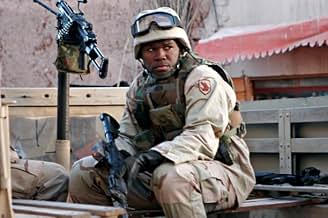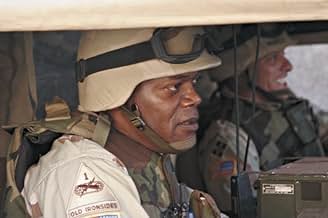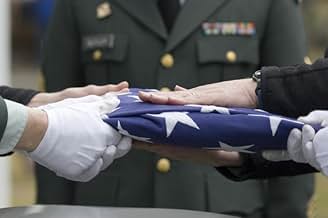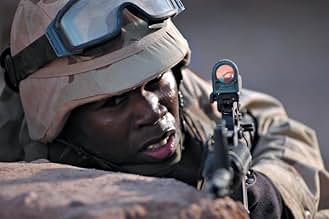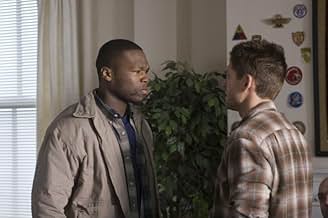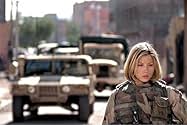CALIFICACIÓN DE IMDb
5.6/10
12 k
TU CALIFICACIÓN
Tres soldados luchan por reajustarse a la vida en casa después de regresar de Irak.Tres soldados luchan por reajustarse a la vida en casa después de regresar de Irak.Tres soldados luchan por reajustarse a la vida en casa después de regresar de Irak.
- Dirección
- Guionistas
- Elenco
- Premios
- 4 nominaciones en total
50 Cent
- Jamal Aiken
- (as Curtis Jackson)
Jeffrey Nordling
- Cary
- (as Jeff Nordling)
Opiniones destacadas
The War Inside, November 6, 2007 By Grady Harp (Los Angeles, CA United States) - See all my reviews (TOP 10 REVIEWER) (REAL NAME) HOME OF THE BRAVE is one of those films that is difficult to critique: the message of how war permanently alters the minds and bodies of soldiers and their families is a meaningful one and one about which we need to be reminded. Irwin Winkler has made some good films (DeLovely, Life as a House, Guilty by Suspicion), but in this film he seems to be working against the script by Mark Friedman which has a tendency to oversimplify emotions and thus loses its impact.
The film begins in Iraq where each of the main characters is at least tangentially connected. Dr. Will Marsh (Samuel L. Jackson) is in a truck driven by Vanessa (Jessica Biel) and accompanied by soldiers Tommy (Brian Presley) and Jamal (50 Cent AKA Curtis Jackson) when a roadside bomb explodes, maiming the hand of Vanessa, killing Tommy's best friend, making Jamal witness unnecessary civilian deaths, and placing Will in an impotent position as a doctor. Flash forward to Spokane, Washington where each of these four wounded people try to piece their lives together in a world that loathes the Iraq war (not at all unlike the treatment of soldiers returning from the unpopular Vietnam debacle), trying to make sense of it all.
The problem with the good idea for a movie lies in the too traditional plot lines. The actors (especially Presley and Biel) give it their all, but credibility enters and the smoke rises and we are left with a misplaced patriotism. The message is strong: the delivery of it is shaky. Grady Harp
The film begins in Iraq where each of the main characters is at least tangentially connected. Dr. Will Marsh (Samuel L. Jackson) is in a truck driven by Vanessa (Jessica Biel) and accompanied by soldiers Tommy (Brian Presley) and Jamal (50 Cent AKA Curtis Jackson) when a roadside bomb explodes, maiming the hand of Vanessa, killing Tommy's best friend, making Jamal witness unnecessary civilian deaths, and placing Will in an impotent position as a doctor. Flash forward to Spokane, Washington where each of these four wounded people try to piece their lives together in a world that loathes the Iraq war (not at all unlike the treatment of soldiers returning from the unpopular Vietnam debacle), trying to make sense of it all.
The problem with the good idea for a movie lies in the too traditional plot lines. The actors (especially Presley and Biel) give it their all, but credibility enters and the smoke rises and we are left with a misplaced patriotism. The message is strong: the delivery of it is shaky. Grady Harp
Director Irwin Winkler's look at post-war life for several Iraq war veterans, is neither totally convincing nor entertaining. Despite having some powerful scenes, which raised some good points from a psychological and political perspective, the film failed to paint a realistic picture, which allowed the audience to truly position itself in the shoes of the characters. As I watched the film I did not entirely believe Samuel L. Jackson or Jessica Biel's character, and both were unconvincing, especially Samuel L. Jackson who had some very good moments, but due to a lacking script, went over-the-top at times. (Brian Presley) was not bad, but having 50 cent in this film was a casting catastrophe. They should have made better choices in the casting, but then again, there was a lot of other flaws in making this film, which I admit, is a tough type of film to make, but this just felt rushed and not enough precision an effort put into producing, writing and creating an original and realistic film about post-ware life.
I thought the cinematography, editing and music did very little to help matters a just didn't engage me throughout the film. The opening sequence which takes place in Iraq is almost a joke, as at times It felt like it was in East LA, now I don't know where they filmed it, but that's not a good way to start off a film. Overall this film had potential but was a misfire in my book, and had it not been for a few good scenes, moral arguments and okay acting (at times), it would get an even lower score from me. 5/10
I thought the cinematography, editing and music did very little to help matters a just didn't engage me throughout the film. The opening sequence which takes place in Iraq is almost a joke, as at times It felt like it was in East LA, now I don't know where they filmed it, but that's not a good way to start off a film. Overall this film had potential but was a misfire in my book, and had it not been for a few good scenes, moral arguments and okay acting (at times), it would get an even lower score from me. 5/10
This film is about how soldiers who served in Iraq face life back in their hometown.
The striking thing is that this film focuses on the emotional impact on the returning soldiers, and the people around them. The dialogs are raw, truthful and at times politically provocative. The portrayal of post traumatic stress disorder is subtle but palpable, and Jessica Biel's performance of a tough woman to hide her pains of losing her hand is astonishingly well acted.
I do not see this as an anti-war vehicle. Rather, it serves as a reminder of how wars affect the soldiers, and then make us think hard whether such a war was necessary in the first place. I am the most impressed by the filmmakers decision on making this movie, as the predominant climate in America is against them.
The striking thing is that this film focuses on the emotional impact on the returning soldiers, and the people around them. The dialogs are raw, truthful and at times politically provocative. The portrayal of post traumatic stress disorder is subtle but palpable, and Jessica Biel's performance of a tough woman to hide her pains of losing her hand is astonishingly well acted.
I do not see this as an anti-war vehicle. Rather, it serves as a reminder of how wars affect the soldiers, and then make us think hard whether such a war was necessary in the first place. I am the most impressed by the filmmakers decision on making this movie, as the predominant climate in America is against them.
A better title would be "Home of the Made-for-TV Movie"--You'd have to be from the "home of the brave film critics" to sit trough this laundry list of post-traumatic syndrome clichés. Three Iraq veterans return to face a civilian world that doesn't understand and personal demons that won't let them forget the ungodly carnage they lived through. But nothing is new or unique, no dialogue is incisive, no action is memorable.
The film does remind us about how unfair the whole Iraq invasion is to the soldier, who not only must suffer the damages to limb, life, and psyche but must also face a hostile electorate which carries little of the respect and patriotism that welcomed soldiers back from WWII. In this way, director Irwin Winkler achieved a success: He catalogued the suffering of the returning soldier, be he a surgeon experiencing the horror of failure to heal or a female grunt losing a hand and learning to live with the clumsiness.
A work of art should be unique in some way, often in its vision of its subject. Home of the Brave says nothing new to a populace awaiting insights into a war that still makes no sense. In that regard both fictional soldiers and real audiences remain largely clueless about the Iraq dilemma. Perhaps President Bush could helpI don't think so.
The film does remind us about how unfair the whole Iraq invasion is to the soldier, who not only must suffer the damages to limb, life, and psyche but must also face a hostile electorate which carries little of the respect and patriotism that welcomed soldiers back from WWII. In this way, director Irwin Winkler achieved a success: He catalogued the suffering of the returning soldier, be he a surgeon experiencing the horror of failure to heal or a female grunt losing a hand and learning to live with the clumsiness.
A work of art should be unique in some way, often in its vision of its subject. Home of the Brave says nothing new to a populace awaiting insights into a war that still makes no sense. In that regard both fictional soldiers and real audiences remain largely clueless about the Iraq dilemma. Perhaps President Bush could helpI don't think so.
Four soldiers return from the Middle East to discover that they can't make the adjustment to fat, peaceful civilian life as easily as they thought they would.
One of my favorite George Carlin routines -- in an intellectually-funny-and-true way -- is how we take strong, simple words, and substitute long, soft phrases that mean very little. The example he used was how the World War One phrase "shell shock", which is simple, graphic, and clear, became the longer and softer "combat fatigue" in the Second World War, and finally "Post-Traumatic Stress Disorder", which is so bloodless and vague it can be used to apply to what happens after any unhappy event. And so we lose the ability to identify and deal with shell shock. When the aftermath of days of constant war is described in the same way as a bruise on the arm, you can treat neither the readjustment to peace, nor a bruise.
That's what this movie is about. Four veterans are left to struggle on their own mid loving family who have no idea what's going on: Samuel J. Jackson, Jessica Biel, Brian Presley, and Curtis Jackson. They all give good performances.
One of my favorite George Carlin routines -- in an intellectually-funny-and-true way -- is how we take strong, simple words, and substitute long, soft phrases that mean very little. The example he used was how the World War One phrase "shell shock", which is simple, graphic, and clear, became the longer and softer "combat fatigue" in the Second World War, and finally "Post-Traumatic Stress Disorder", which is so bloodless and vague it can be used to apply to what happens after any unhappy event. And so we lose the ability to identify and deal with shell shock. When the aftermath of days of constant war is described in the same way as a bruise on the arm, you can treat neither the readjustment to peace, nor a bruise.
That's what this movie is about. Four veterans are left to struggle on their own mid loving family who have no idea what's going on: Samuel J. Jackson, Jessica Biel, Brian Presley, and Curtis Jackson. They all give good performances.
¿Sabías que…?
- TriviaSamuel L. Jackson and Christina Ricci appeared in Black Snake Moan (2006).
- ErroresWhen one soldier is told to fire the AT-4 at a gunman on the roof, he is holding it backwards when he is firing it. The rocket comes out of the smaller end of the tube, not the larger.
- Citas
Will Marsh: Buck Fush? Buck you, you son of a bitch.
- Bandas sonorasTry Not to Remember
Written and Performed by Sheryl Crow
Produced by Stephen Endelman
Warner-Tamerlane Publishing Corp. (BMI)/Old Crow Music (BMI)
(All rights adnimistered by Warner-Tamerlane Publishing Corp.)
Courtesy of A&M Records
Selecciones populares
Inicia sesión para calificar y agrega a la lista de videos para obtener recomendaciones personalizadas
- How long is Home of the Brave?Con tecnología de Alexa
Detalles
- Fecha de lanzamiento
- Países de origen
- Sitios oficiales
- Idiomas
- También se conoce como
- Regreso al infierno
- Locaciones de filmación
- Productoras
- Ver más créditos de la compañía en IMDbPro
Taquilla
- Presupuesto
- USD 12,000,000 (estimado)
- Total en EE. UU. y Canadá
- USD 51,708
- Fin de semana de estreno en EE. UU. y Canadá
- USD 6,000
- 17 dic 2006
- Total a nivel mundial
- USD 499,620
- Tiempo de ejecución
- 1h 46min(106 min)
- Color
- Mezcla de sonido
- Relación de aspecto
- 2.35 : 1
Contribuir a esta página
Sugiere una edición o agrega el contenido que falta


